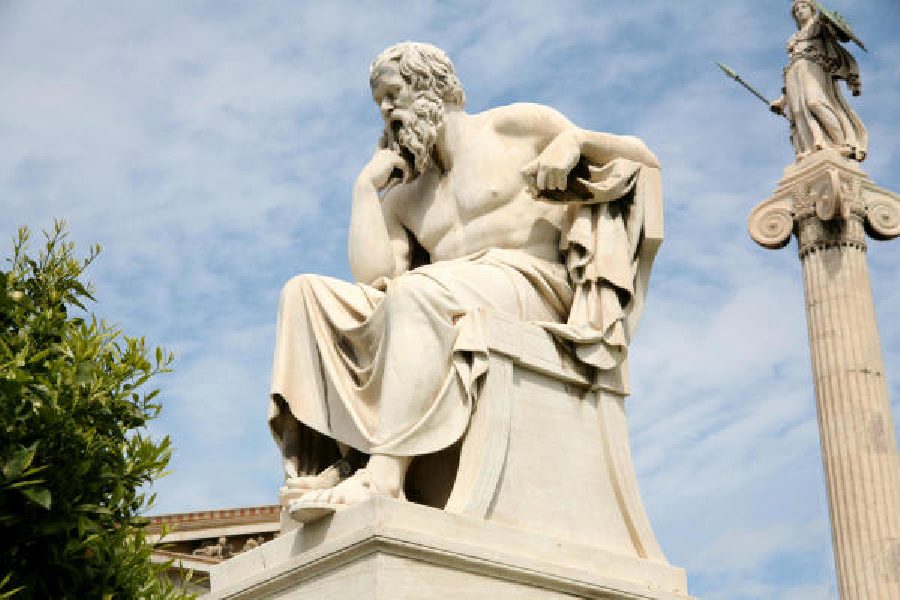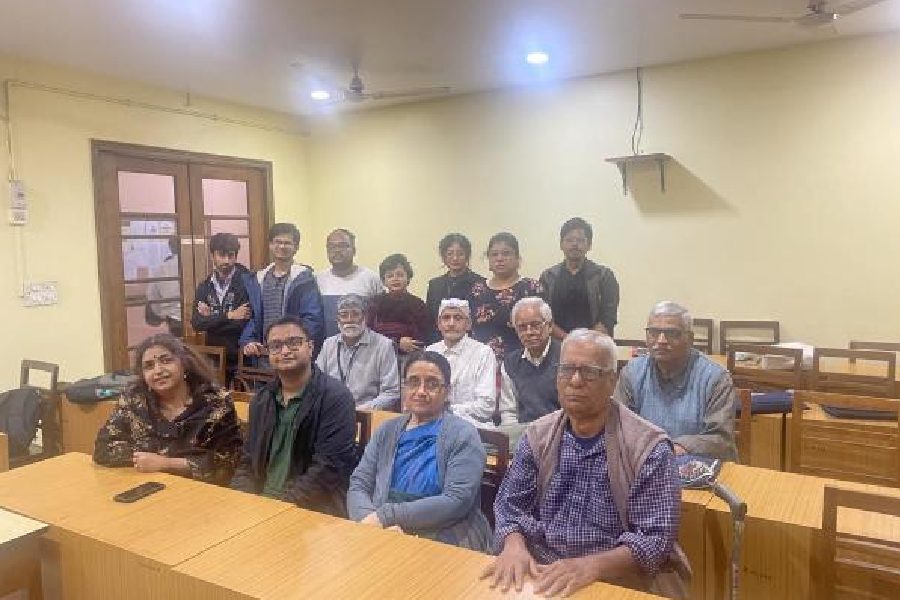The announcement was as brief as it was staid. “Ramakrishna Mission Institute of Culture, Golpark’s School of Languages is loved by language enthusiasts of Calcutta. Twenty-one languages taught here, 6 Indian and 15 foreign — the only place in India where ancient Greek is taught... A special evening organised wherein students and teachers sang and recited poetry in many languages.”
The question that came to my mind was — who learns ancient Greek? Next question — can I meet them? I was told, “Please wait; they have their exams now.”
A fortnight later, I found myself in quite a packed classroom. Whatever I was expecting, it was not this — there were college and university students of course, school and college teachers too, but there were also quite a number of 60-plus retired professionals.
Prabir Kumar Dey and Pradip Kumar Bandopadhyay are greyheads. Would it be okay to mention their age? “Of course. You must,” said Dey. Both men are 73, both retired bankers. Asit Baran Kumar, 68, and Swapan Kumar Ray, 69, once served the Indian Railways. Housewives don’t retire and Goutami Maitra, 65, is no exception. She married young and familial chores keep her busy still but she finds time to make it to this class. And while the elders are the main cast of this story, it would not be fair to omit their younger classmates. Suchita Datta, 39, who wants to study language preservation, Debopom Ghosh a third-year history student, Harshit Singh a final-year master’s student, Sayan Banerjee who teaches mathematics in a school and Sunirmal Das who is a university teacher. At 77, Subhas Chandra Sarkar is the oldest in the room that day. He plans to join the ancient Greek course once he has completed the two-year Latin course.
Many of those who are now studying ancient Greek arrived here via Latin or Sanskrit, (some of them) already having learnt other languages. After retiring from his bank job, Bandopadhyay learnt French, German, Spanish. “There was no scope to quench other curiosities once one turned professional,” he said by way of explaining this apparently odd pursuit. He continued, “And then I joined Latin classes here. I knew of Homer, snatches of Iliad and Odyssey, nothing more. Madam’s Latin class was engrossing, and once the two-year course was over, I decided to learn Greek.”
No two stories are the same. Maitra recalled what a teacher said when she joined college for her bachelor’s in philosophy. “I remember the first class in Western philosophy and the professor quoting Rene Descartes — cogito, ergo sum.” She too followed “Madam”, came to the ancient Greek class following the trail of Latin lessons.
Kumar, 68, came to join the Sanskrit class with his wife post-retirement. He was known to Bandopadhyay and at the latter’s prodding, the couple ended up joining Latin and Sanskrit. “We had all the time in the world,” he said. He is part of the ancient Greek class now. “Pradipda is an accomplished musician; he plays the sitar and also the jaltaranga,” he offered, as if to emphasise that the man whose cue he took is no ordinary individual.

Socrates outside the Academy of Athens
In between this swapping of tales, Madhusree Gupta — the otherwise self-effacing but hugely popular “Madam” of earlier references — briefs the new joinees. Says Gupta, “Learning ancient Greek does not mean learning to speak in Greek. The version that is spoken today is modern Greek. Ancient Greek is an exploration of a lost culture and context for us. Borne on treatises and rules of grammar, you can travel back in time.” She continues, “And after we have got a good idea of the grammar, we shall move on
to literature. We shall read Sappho.”
She must have noticed either Somoshree Palit, who is waiting to fly out for higher studies, or Sangya Pal, who is a first-year student of English literature, break into a smile and stifled squeal for she says, “When I first learnt the language, I too remember borrowing a black pen from a classmate and writing the words ‘Sappho Catullus Horace’, as if to imprint them on my brain.”
In this class, the seniors have in common with their younger classmates and teacher an intellectual curiosity. Somoshree said while prepping for her paper on text and performance, she read a number of Greek classics but it was reading about the Chorus in Greek plays and their rhythmic dance set to iambs that finally fired her interest in learning the language. Sangya said, “My dream is to read the classics in the original.” Swapan Ray spoke about Delphic maxims and resonances with the teachings of the Gita. Maitra about similarities between Athena and Saraswati, Hephaestus and Viswakarma.
“I know little Latin, less Greek,” said Sarkar, doing his spin on Ben Jonson’s eulogy of Shakespeare. Which brings us to this retired bureaucrat’s story. It has no apparent connection with ancient Greek, but it won’t be Greek to anyone.
A personal tragedy propelled Sarkar to this institute. After his son died in 2010 of alleged medical negligence, Sarkar sued two doctors. Four years later, when the lawyers had made no progress, he decided to study law. In 2019, he became an advocate, fought two cases for his son. To make sense of the Latin words in legal studies Sarkar joined the Latin course. He said, “But I want to learn Greek as I have literary interests. I had wanted to be a professor of English.”
A moment’s silence and then Maitra broke it. “This class keeps exhaustion away. They should make it a two-year course,” she said. Sarkar added, “I know I am speaking for everyone when I say, an engagement with language and literature keeps depression away.” The last word belongs to Dey. He said, “All through childhood, we knew of lekha-pora. Some of us are now getting a taste of khela-pora.”
I would have translated that, but some things speak to a universal audience.










